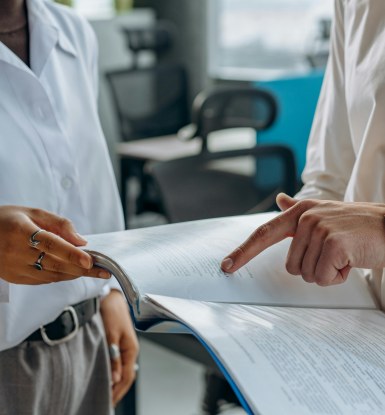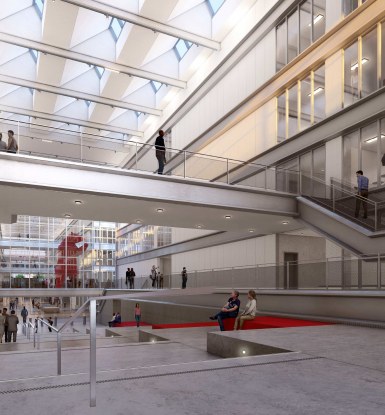As part of its mission to break students out of their comfort zone, bring them into direct contact with the corporate world and drive them to share their perspective on that same world, the MSc in Health Management & Data Intelligence had a brainwave – “to bring Space down to Earth”. Participating students and industry experts share their experience of the program’s “Space Health” module.
Fully aligned with the emlyon business school “Transforming Early Makers” ethos and NASA’s Human Research Program (HRP), the ESA and the French CNES, this years’ Space Health module brings together participating students and technicians, doctors and scientists, bolstered by academic and corporate coaching. The aim? To propose prototype solutions for future space travellers, focussing on the areas of medical monitoring, sleep in isolation, the psychological effects of space travel, and cognitive behaviour in small groups. For Program Director Florencio Travieso, the learning process outweighs the end product: “we want to shake our students up a bit, work in a hive, benefit from industry expertise and provide an aggressive response to the issue, especially given the health context in which we have been living these past couple of years.”
Identify, Explore, Implement
Via group work, direct contact with people working in the field and the intervention of guest speakers (including Mathias Basner, Professor and Director from the Department of Psychiatry, University of Pennsylvania - Perelman School of Medicine), each student team worked on specific angles on the issue and made proposals to the participating industry experts, for the mutual benefit of all. For current student Adrien Chenderoff the benefits of this set-up were plain to see: “I was very attracted as I want to be part of the pioneers that are trying to enable space travel. I wanted and still want to provide solutions to astronauts today that will make a positive contribution to humanity and uncover the mysteries of the universe.”
The win-win learning experience provided by the program module is echoed by Graham Mackintosh, AI Projects Consultant, NASA Advanced Supercomputing (NAS) Division: “As an AI researcher working on projects at NASA, I gave a lecture to the students in the Space Health course to discuss the unique health challenges associated with life in space, and the ways in which the innovations that address those challenges can be used to create new healthcare business opportunities here on Earth.” All aided and abetted via a carefully thought-out program structure designed to help students identify the issues in question, explore potential solutions, and then propose how to implement them.
The final frontier?
Amongst the final frontiers for exploration were the detection of changes of behaviour in the context of space travel, brain activity, sexual activity in ultimately non-intimate surroundings, nutrition, medial issues, and sleep management. A pragmatic approach was taken to developing a business plan in order to better manage them. As Clarissa Gorin, Medical Innovation Manager at Ad Scientiam, observes, such matters are very much on the table as we speak: “As the first space tourist flights were organised this year, it is interesting to start questioning the new challenges that this democratization of space induces, especially on health. This course combines new technologies and medical issues, especially in terms of remote connected health and health behaviour changes and is at the forefront of innovation on contemporary topics.”
It should come as no surprise that this module dovetails with emlyon business school’s Transforming Early Makers scheme. Current student Nidhi Bhatnagar concurs: “Transforming Early Makers has always ventured on the new unexplored areas to find solutions and innovations. I got involved in the space health course as a part of my TEM project. Working on space health can serve as an incubator for testing ideas and developing new innovative solutions for existing problems on Earth. The knowledge of health in Space gives mankind a new dimension to understand the body’s response to external environment stressors and modifying the same.”
Insights and learnings
Beyond the learning process and the opportunity for students and professionals to work in close tandem, the benefits are numerous, as evidenced by the participants themselves. For Clarissa, the course “provided the chance to discuss with students the opportunities offered by new technologies, including digital biomarkers, to enable remote monitoring of physiological and behavioural health outcomes” whilst for Graham new insight was gained into a particular aspect of his work: “one of the student teams were working on the possibility of using biomarkers, such as changes in a person's gut microbiome, to measure an individual's stress levels. This was a new idea to me, and I think it sounds like an exciting concept.”
On the student side, Adrien insists on the nature of the group work as much as the content: “every student played the role of finding ideas, confronting them to reality and transforming them into feasible solutions. I learned the entire process from the idea to the conceptualization of a solution. I had to integrate myself into working as a team with people from different origins, cultures, and background. I am convinced that everything I did was useful both from an intellectual and a business point of view.” This sentiment is echoed by Nidhi, under the umbrella of the business school’s Transforming Early Makers moniker: “the process of TEM taught me how to approach a problem systematically and explore possible innovative solutions using various theories and models. As a public health expert every step and learning from TEM will be guiding me in my academic and consulting assignments.” Lifelong learning, in Space and on Terra Firma.


